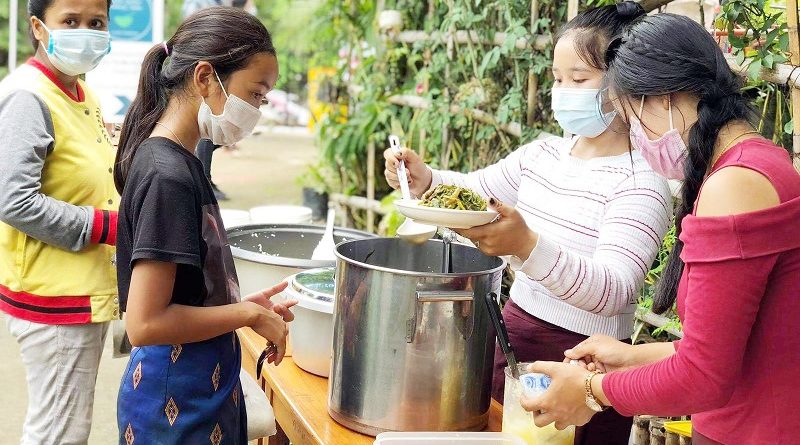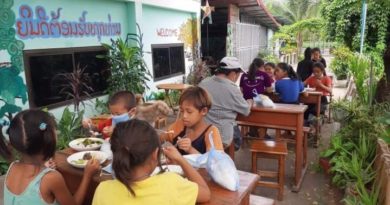Solidarity Canteen Fills Empty Stomachs In Luang Prabang
Source: Vientiane Times
Since the Covid-19 pandemic has taken hold, everyone has been affected by problems of some kind, including business operators, government officials and the general public.
Luang Prabang province is one of the worst hit areas in Laos because it is heavily dependent upon tourism, and visitor numbers have plummeted due to travel restrictions.
This has meant that many people have gone hungry as their source of income has dried up. Fortunately, a homegrown charity called the Solidarity Canteen of Luang Prabang believes that giving good food to the poorest people is a public responsibility.
Last week, the organisation celebrated the provision of its 30,000th meal, a true milestone in its service to impoverished households around the town.
The canteen first opened at the French Institute in mid-July 2020, with support from the French Embassy, private donors and volunteers.
The team had no idea that the effects of the pandemic would last for so long, thinking the situation would probably continue for about three months.
Nor did they have any idea of the extent of the economic devastation the people of Luang Prabang were facing.
After a few months, the operation moved to the grounds of the Luang Prabang public library, where it continued for seven months as the number of meal recipients grew steadily.
Realising the need was greater in villages on the periphery rather than on the peninsula, the team asked the provincial government for permission to decentralise and enable restaurants in villages to take part in the scheme.
Official, written permission was granted by the provincial Governor to operate a distribution canteen with four branches in May 2021.
The new canteen now serves up lunch to 150 needy people six days a week and operates out of the Deaf-Mute Centre in Phoumock with the Sisters of Charity on Mondays, Wednesdays and Fridays and out of Korpai restaurant in Naxangveauy on Tuesdays, Thursdays and Saturdays.
Additional outlets in the north and west are planned for Phouxang Kham and Chomphet districts, provided that sufficient funds can be raised.
This writer spent a week taking part in the canteen’s activities and found that 95 percent of the volunteers and staff are Lao. Most of the beneficiaries are females aged from 2 to 90, and all the major ethnic groups are represented.
The canteen provides lunch including ice-cream or cake from 11:30am to 1:30pm. The beneficiaries have their own PIN number and every day more turn up.
Every beneficiary is interviewed and scored periodically using a means-testing questionnaire like the one used by the Lao Children’s Hospital.
People like to eat at the restaurant and can also take food home to their families.
One boy having lunch at the Korpai restaurant told this Vientiane Times reporter that he comes here two or three times a week and likes the food he gets, especially the ice-cream and cake. On the days when he doesn’t go to the restaurant, his sister or mother come and take some food home for him.
“I always come here if I’m not busy because then I can have ice-cream, but if my mother collects a meal and brings it home I don’t get ice-cream,” he said.
The canteen often coordinates with other local charities: a scholarship fund (many of the volunteers are scholarship students at local universities and vocational schools), the Lao Children’s Hospital (for nutritional guidance, nursing advice, outreach for needy families) and the Deaf-Mute Centre (which runs the southern and largest branch), among others.
Project Manager Bob Preston said he was concerned about the impact of Covid-19, so he joined forces with Gilles Vautrin, the French Consul in Luang Prabang, to set up a soup kitchen last summer. In October, Gilles asked him to assume the leadership, but they had no idea the scheme would get so big or continue for so long.
“I have done my best to draw in a Lao team and to decentralise in order to bring aid to the people who most need it, and empower local people, charities and businesses. We are now looking at sourcing more sustainable opportunities to support the canteen,” Bob said.
The project is ambitious to create a self-sustaining, virtuous circle with the Solidarity Canteen, scholarships, job/career development and a community garden. They have no political or religious objectives, and their activity is concentrated on Luang Prabang, where the economic impact of Covid-19 has been particularly harsh due to the drop in tourism.
To run such an undertaking, they constantly need to raise funds, with 94 percent of donations going directly into the provision of meals. The rest is spent mainly on bank/credit card fees, staff stipends, petrol and utilities. They are a grassroots operation, with most donors being private individuals and small companies.
For more information and to donate, please visit facebook.com/solidarityCanteenLuangPrabang




